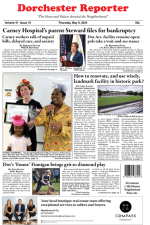March 10, 2011
The Massachusetts Affordable Housing Alliance (MAHA) celebrated the 20th anniversary of a popular mortgage initiative— the SoftSecond Program — on Saturday, March 5 with a gathering of community members, bankers, activists and elected officials at its Dorchester Ave. headquarters. MAHA also honored twenty local women, the majority hailing from Dorchester or Mattapan, who have worked to guide families to home ownership over the past two decades.
The SoftSecond program began in 1991 after a study by the Federal Reserve Bank of Boston indicated that “racial bias” was partly to blame for a shrinking amount of resources invested into low income and minority communities by banks, particularly in terms of mortgage lending during the late 1980s. An agreement was eventually worked out between civic groups such as MAHA and local banks and government agencies which provided some $30 million in below market home loans to be targeted to under-served communities.
The SoftSecond model used to distribute the loans was launched as a pilot in 1990.
The program provides participating homeowners with two mortgages: the first for 75 percent of the home price and a second for 20 percent with a down payment of 5 percent by the buyer. The second loan is termed “soft” since homeowners only pay for the interest instead of the principal for the first ten years. Several other cost cutting measures are also applied, including payment assistance, public subsidies and low interest rates, which are made possible by a reserve fund that covers losses incurred by the banks.
Since the beginning, Soft Second has been managed by the Massachusetts Housing Partnership (MHP) which has been described by agents as providing the link between banks and government organizations, while community groups like MAHA advocate on the behalf of individual families. MHP has also been responsible for creating and managing the reserve find. So far, nearly 15,000 families have received Soft Second loans, according to MHP reports. While the loans are restricted to families making less than 80 percent of the median Massachusetts income, some MAHA supporters were enthusiastic about connecting with other housing markets.
“It was interesting negotiating with these bankers in business suits, because it was hard for them to understand our conditions,” said Dorchester honoree Diana Strother, who was one of the first homeowners to receive a loan. “Now what we are beginning to realize, especially in this economy, is that these kinds of programs have a large effect—that they can affect everyone in a positive way.”
Several of the twenty honorees were recipients of Soft Second loans before working with MAHA. Each honoree was presented with a City Council resolution by City Councillors Stephen Murphy and Charles Yancey and State Representative Russell Holmes. In addition, MAHA unveiled the 20/20 vision wall, a photo gallery of the twenty honorees, describing their accomplishments.
“I was so surprised by the resolution,” said honoree Thadine Brown of Mattapan, a single mother who received volunteered her time at MAHA after receiving a Soft Second loan. “To see other families in the same position that I was in and to then to be the one to give them the same kind of hope that I got from MAHA—it’s a powerful experience.”
The twenty women are Acia Adams-Heath of Dorchester; Sonia Alleyne of Dorchester; Adrianne Anderson of Methuen; Thadine Brown of Mattapan; Symone Crawford of Mattapan; Teodolinda Darosa of Dorchester; Marilyn Douglas of Dorchester; Arnetta E. Ferguson of Dorchester; Juana Gayle-Flores of Roxbury; Roslyn George of Roxbury; Karen Glass of Roxbury; Shelly Goehring of Dorchester; Cheryl Grannum of Dorchester; Skye Kessler of Dedham; Esther Maycock-Thorne of Brockton; LaTanya Ramsey of Allston; Mary Singleton of Mattapan; Diana Strother of Dorchester; Cortina Vann of Dorchester; and Anna Young of Roxbury.
Going forward, MHP representatives say that they will be focusing on lobbying legislators in order to expand programs such as SoftSafe or to negotiate for similar programs in a recovering economy.
“At the beginning, we were working to convince banks to work with us, and now many have become our allies,” said Clark Ziegler, the Executive Director of MHP. “Now we are doing something similar in Washington, where we are trying to provide evidence that programs like this are actually making a difference.”



